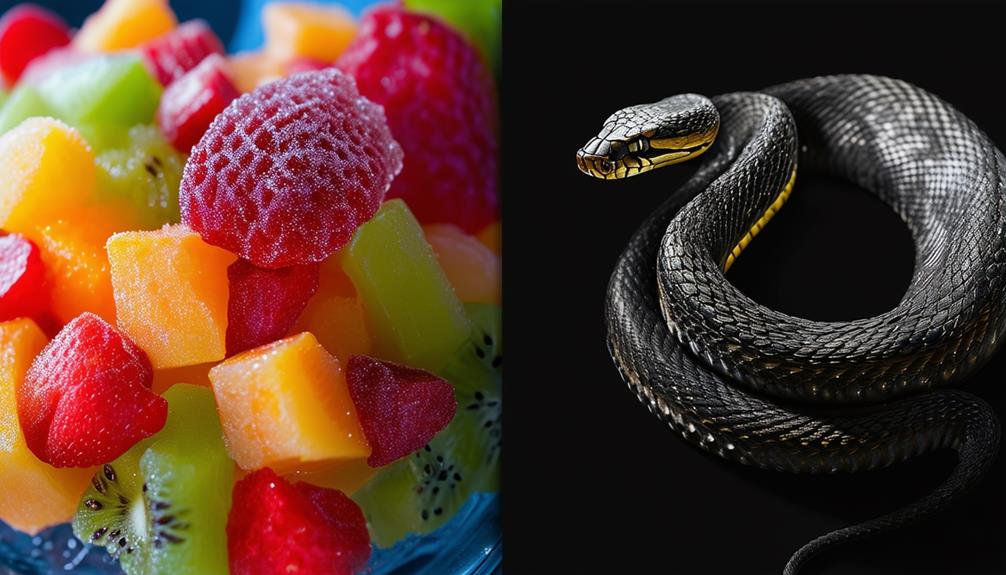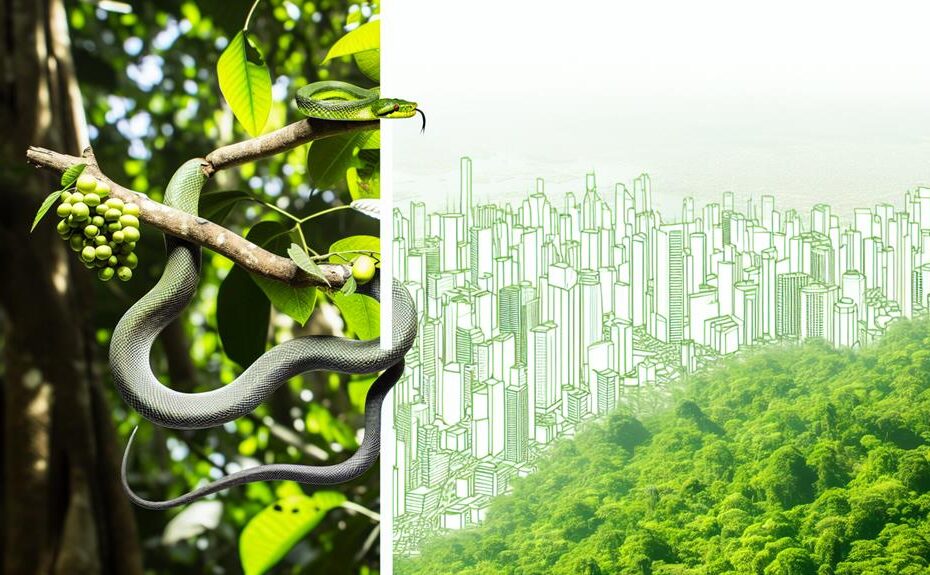You might be wondering if Mambas, those tasty fruit chews, fit into your vegan lifestyle. At initial glance, it seems like they should – they're fruit-based, colorful, and fun. But, as you delve deeper into the ingredients, you'll uncover a different story. What you find might just change the way you think about this seemingly innocent snack.
Mamba's Fruitful Vegan Conundrum
When you unwrap a Mamba, you may not realize that the chewy, fruit-flavored candy is actually hiding two non-vegan ingredients that can disrupt your plant-based diet.
You might assume that Mambas are vegan-friendly, given their fruity flavors and colorful appearance. However, taking a closer look at the ingredients list reveals a different story.
Mamba's ingredients include gelatin, which is derived from animal collagen. This means that Mambas contain animal products, making them unsuitable for vegan diets. The gelatin used in Mambas comes from cows and pigs, further solidifying their non-vegan status.
This might come as a surprise, especially since Mambas are often perceived as a harmless, sweet treat. However, it's important to be mindful of the ingredients in the foods you eat, especially if you follow a vegan lifestyle.
Remember to always check the ingredient list and look for certified vegan labels to make sure that your snacks align with your dietary choices.
Fruit Chews Contain Gelatin
As you investigate the ingredients of Mamba's fruit chews, you'll notice that they contain gelatin, which might raise some concerns.
When you take a closer look at the specific components, you'll find that Mamba Fruit Chew Flavors, gelatin, and beeswax are all part of the mix.
These ingredients will be essential to understanding why Mambas aren't vegan, so let's take a closer look.
Mamba Fruit Chew Flavors
When considering the Mamba Fruit Chew flavors, you might be tempted by the fruity options like:
- Orange Mango Fruit Flavor
- Pineapple Orange Fruit Flavor
- Raspberry Lemon Fruit Flavor
However, it's crucial to keep in mind that these flavors, as appealing as they may be, contain gelatin, making them non-vegan.
As you delve into the world of Mamba Fruit Chews, bear in mind that the inclusion of gelatin in these flavors means they're not suitable for those following a vegan lifestyle.
Orange Mango Fruit Flavor
You might expect Mamba's Orange Mango Fruit Flavor to be a sweet and tangy treat, but the presence of gelatin in these fruit chews makes them off-limits for vegans. Gelatin, derived from animal collagen, is used for their chewy texture.
Fortunately, vegan alternatives like YumEarth Organic Fruit Chews offer a similar taste without the gelatin.
Pineapple Orange Fruit Flavor
Mamba's Pineapple Orange Fruit Flavor, another popular variety, also contains gelatin, making it a non-vegan option. You might be disappointed, but the reformulated Mamba Fruit Chews now contain gelatin, sourced from animal collagen, making them unsuitable for vegans.
| Flavor | Gelatin Content | Vegan-Friendly |
|---|---|---|
| Pineapple Orange | Contains Gelatin | No |
| Orange Mango | Contains Gelatin | No |
| Raspberry Lemon | Coming Soon! | |
| Strawberry Watermelon | Contains Gelatin | No |
Raspberry Lemon Fruit Flavor
Raspberry Lemon flavor, a popular Mamba fruit chew variety, disappoints vegans with its non-vegan status due to the presence of gelatin.
As you investigate the ingredients, you'll find that gelatin provides the chewy texture, making it unsuitable for your vegan lifestyle.
You'll need to consider alternative fruit chew options that don't contain animal-derived ingredients like gelatin.
Gelatin and Beeswax Inside
When you delve into the ingredients of Mamba fruit chews, you'll discover some surprising non-vegan components. Specifically, you'll want to investigate the presence of gelatin and beeswax, which raise crucial questions about the candy's vegan status.
Let's break down the key points:
- Gelatin comes from animal bones.
- Carmine is derived from crushed insects.
- Confectioner's glaze is also sourced from insects – all of which have significant implications for vegan consumers.
Gelatin From Animal Bones
You might be surprised to learn that the chewy texture of Mamba fruit chews comes from gelatin, a non-vegan ingredient derived from boiled animal bones, cartilage, and skin.
This gelatin is an animal-derived ingredient, making Mambas unsuitable for vegans. It's a key component that gives Mambas their signature texture, but it's also what disqualifies them from being vegan-friendly.
Carmine From Crushed Insects
Mamba's fruit chews also contain carmine, a red food coloring derived from crushed cochineal insects, which adds to their non-vegan status. This ingredient, along with gelatin and beeswax, makes Mambas unsuitable for vegans.
| Ingredient | Description |
|---|---|
| Carmine | Red food coloring from crushed insects |
| Gelatin | Provides chewy texture, derived from animal collagen |
| Beeswax | Glazing agent, non-vegan ingredient |
Confectioner's Glaze From Insects
Two ingredients in Mambas' fruit chews that immediately raise red flags for vegans are confectioner's glaze and gelatin, both of which have animal-derived components.
Confectioner's glaze, also known as shellac, is derived from the secretions of the lac bug, an insect. Moreover, some Mambas flavors contain beeswax, another animal byproduct.
Gelatin in Fruit Coatings

As you investigate the ingredients in Mamba candy, you're likely to find more non-vegan elements beyond gelatin in fruit coatings.
You might be surprised to learn that some food products contain honey, and that beeswax is sometimes used as a coating on fruits.
Let's take a closer look at these additional factors that can affect the vegan status of your favorite treats.
Honey in Food Products
When you investigate the ingredients in Mamba candies, you might be surprised to find that some of them contain non-vegan ingredients beyond gelatin. When checking the labels, keep an eye out for these additional non-vegan ingredients:
- Confectioner's Glaze derived from insects
- Shellac derived from insect secretions
- Lanolin found in fruit waxes.
Confectioner's Glaze From Insects
When scanning the ingredient list of your favorite fruit snacks, including Mambas, you may stumble upon confectioner's glaze, a common coating derived from the lac bug's secretions.
This non-vegan ingredient, along with gelatin and honey, can be hidden in seemingly harmless treats.
Be sure to check labels carefully to avoid these animal-derived ingredients and make informed choices about your food.
Shellac From Insect Secretions
You might be surprised to learn that the shiny, colorful coating on your favorite fruit snacks, including Mambas, is actually shellac, a non-vegan ingredient derived from the secretions of the lac bug.
Shellac is often used in fruit coatings, while gelatin is added to Mamba Fruit Chews for texture.
Both are non-vegan ingredients to be aware of.
Lanolin in Fruit Waxes
Fruit waxes are often used to give fruits a shiny appearance. Commonly, these waxes contain lanolin, a wax derived from sheep's wool. This ingredient is avoided by vegans due to its animal origin.
As you shop for fruits, it's essential to be aware that some may have lanolin-based waxes, making them non-vegan. To adhere to a plant-based diet, opt for vegan-friendly alternatives or choose unwaxed fruits.
Beeswax Coating on Fruits
When examining the ingredients of Mamba candies, you'll want to contemplate another potential non-vegan culprit: beeswax coatings on fruits. You might be surprised to discover that some fruit-flavored Mambas contain beeswax, which isn't vegan-friendly due to its origin from bees.
Here are 3 more points to bear in mind when reviewing the ingredients:
- Carmine-based fruit colorants,
- L-cysteine in fruit gummies, and
- Glycerin from animal fat – all of which can impact the vegan status of your favorite candies.
Carmine-Based Fruit Colorants
Carmine, a vibrant red food coloring derived from crushed cochineal insects, sneaks its way into some Mamba fruit coatings, further solidifying their non-vegan status.
As a vegan, you might want to think twice about consuming Mamba Candy, which uses carmine-based fruit colorants. These additives contradict your vegan lifestyle, making it crucial to consider alternative, gelatin-free options that align with your dietary choices.
L-Cysteine in Fruit Gummies
You may be surprised to find that L-cysteine, an amino acid commonly used in food production, can be derived from both animal and plant sources, making it a potential pitfall for vegans who indulge in fruit gummies like Mambas.
As a vegan, scrutinizing the ingredients is crucial, as L-cysteine's origin can impact the vegan status of your favorite fruit gummies.
Glycerin From Animal Fat
By examining the ingredients of your favorite fruit snacks, including Mambas, you'll realize that gelatin, derived from animal collagen, is often used in fruit coatings, making them non-vegan.
Moreover, some fruits may be coated with beeswax, another non-vegan ingredient. Glycerin from animal fat might also be present.
As a conscious consumer, it's up to you to make a personal choice about what you eat.
Rat Hair in Food
Contaminants like rat hair can occasionally find their way into food products, including fruit chews like Mambas. This already poses a concern for vegans due to gelatin and beeswax in their coatings.
These animal-derived ingredients, like gelatin and beeswax, can be a turn-off for vegans. Be cautious and always check labels to avoid unwanted additives in your treats.
Gelatin's Unfortunate Vegan Reality
Gelatin, a seemingly harmless ingredient, is actually the culprit behind Mambas' non-vegan status, as it's sourced from animal collagen, making it a major obstacle for those adhering to a plant-based diet. You might be wondering why gelatin is such a big deal. Well, it's because gelatin is derived from cows and pigs, making Mambas non-vegan.
Here's a breakdown of the gelatin dilemma:
| Gelatin Source | Vegan-Friendly? |
|---|---|
| Animal collagen (cows and pigs) | |
| Plant-based alternatives |
As you can see, traditional gelatin is not vegan-friendly. However, there are vegan alternatives to Mambas, such as fruit chews made without gelatin. If you're a vegan who loves Mambas, don't worry! You can still enjoy similar treats that align with your dietary choices.
Conclusion
So, are Mambas vegan?
Unfortunately, the answer is no. With gelatin sourced from cows and pigs, beeswax, and other non-vegan ingredients, Mambas don't align with a vegan lifestyle.
Even specific flavors like Orange Mango and Pineapple Orange contain gelatin, making them unsuitable for vegans.
If you're committed to a plant-based diet, it's best to investigate alternative fruit chews that cater to your dietary preferences.
